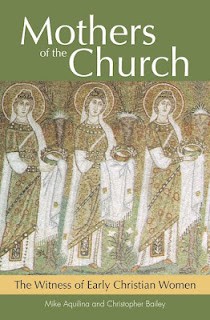
Most people have heard of the Early Church Fathers, but the Mothers of the Church. . . there’s a category of saints we hear less often.
In part, that is due to the fact that not many of the early Christian women wrote. Yet that should not obscure the important contribution women made to the early Church.
In fact, as a number of sociologists and Church historians have demonstrated, Christianity involved a revolutionary recognition of the unique dignity of women.
No one highlights this better than best-selling author and patristics expert, Mike Aquilina. Mike is the guest in the most recent episode of The Sacred Page Podcast. He discusses a new book he recently co-wrote with Christopher Bailey, The Mothers of the Church: The Witness of Early Christian Women (Huntington, Ind.: Our Sunday Visitor, 2012).
This is a tremendously good book and it fills an important lacuna—here we have a book that focuses on the influence of important Christian women. He talks about a number of fascinating areas.
First, he highlights the fact that Christianity brought about a revolutionary recognition of the dignity of women. Put simply, daughters were frequently described as a burden. A careful analysis of Greco-Roman society reveals that many infant girls were simply discarded at birth, left to die in sewers. One ancient piece of correspondence involves a letter sent by a man away on a business trip to his wife at home. It reads:
“Know that I am still in Alexandria. And do not worry if they all come back and I remain in Alexandria. I ask and beg you to take good care of our baby son, and as soon as I receive payment I shall send it up to you. If you are delivered of a child [before I come home], if it is a boy keep it, if a girl discard it.”— Hilarion’s letter to his pregnant wife (A.D. 1)*
Of more than 600 2nd century families recorded at Delphi only 1% had raised two girls!**
Why the aversion to women? Mike Aquilina writes
“But what good was a girl? If the parents were lucky, their daughter might marry into a powerful family and make a useful alliance for them. More likely, though, they would have to feed and care for her for fifteen years or so, and then they would have to pay some useless wastrel a ruinous dowry for taking her off their hands. No wonder one of the favorite adjectives for “daughters” was “odious.” (Mothers of the Church, 15).
He goes on to explain how girls rescued from the infanticide were often brought up to become child-sex slaves and to work in brothels.
Second, Aquilina highlights how Christians responded to the situation: they saved the young girls from death—and from a life of sexual slavery. By the time of Constantine this meant that a sizable portion of the Roman population were Christians!
Third, Aquilina highlights the incredible contribution of early Christian women such as Macrina—the man one of the Capadocian fathers described as “the Teacher”.
He also tells the story of saints such as Felicity and Perpetua. The two saints are mentioned in Eucharistic Prayer #1 and are therefore probably familiar to most Catholics—but most do not know much about them!
Mike is a great guest. . . I’m sure you’ll agree! Check out the book and the podcast.
Click here for a bit more about our guest Mike Aquilina.
* Cited in Naphtali Lewis, Life in Egypt under Roman Rule [Oxford: Clarendon, 1985], 54.
** Susan Scrimshaw, “Infanticide in Human Populations: Societal and Individual Concerns,” in Infanticide: Comparative and Evolutionary Perspectives (eds. G. Hausfater and S. Hardy; Piscataway, N.J.: Aldine Transaction, 2008), 439.